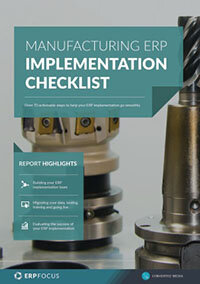ERP users, system integrators, and the missing link
To be successful in the long term, companies need to be very good at what they do, be that manufacturing, distribution, retail, construction, or whatever, and that means mastering key skills. But, essential as they are, these skills are not enough: companies need good systems and nowadays that includes a good ERP system.
However, for most companies, selecting and implementing an ERP system is not one of their core skills and so, for that reason, and also because implementing an ERP system requires a lot of resources, many companies delegate the task (perhaps too much of the task) to systems integrators (SIs).
Unfortunately, the seemingly weekly reports of major ERP project failures (Lidl, National Grid, Haribo, Revlon, etc) suggest that employing even the most expensive SIs doesn't guarantee success. Something is going wrong and it's probably too simplistic to say that the problem is just that, when companies have no core skills in choosing and implementing ERP, they probably have limited experience in choosing SIs to do the job for them either.
Perhaps one contributing factor is that there is a disconnect because customers and SIs have different objectives; or rather that they have the same objective: to make money. But the SI's project managers and consultants are gauged and rewarded by the profits that they generate for their own company; not for clients.
That is perhaps inevitable and not entirely unfair because, after all, most customers don't have the SI's profitability high on their list of priorities. And anyway; even if customer satisfaction was a criterion in a consultant's yearly performance appraisals, it would be practically impossible to measure because, on a large contract, the customer has no objective way of measuring the contribution of individuals.
The result is that, however often SIs talk about being your implementation partner, in reality, they see you first and foremost as a revenue stream. So it's hardly surprising that research by a major independent ERP consultancy reveals that 79% of ERP projects run over time and 64% run over budget; this is at a time when failure rates are rising and predicted to rise further.
When SIs are billing substantial amounts for large teams of consultants, clearly it is in their best interests for projects to be drawn out for as long as possible, even if they suspect that they will ultimately end in failure.
Take, as an example, Lidl's recent decision to pull the plug on its ERP project because a serious problem with the software's capabilities had been identified. That was seven years into the project and three years after an apparently successful pilot in its Austrian stores.
It beggars belief that it took seven years to identify a problem that was so fundamental that it warranted the write-off of an investment of more than half a billion dollars. We may never know whether it did, indeed, take seven years for the problem to be spotted or whether it was actually identified early in the project (as it should have been) but someone decided not to wave a red flag and to let the project continue anyway.
It may be that the person responsible was actually a member of Lidl management who may have been hoping that, even after seven years, a resolution to the problem could be found. But clearly, someone was not acting in Lidl's best interests.
Looking at another recent high-profile failure, the SI Wipro has reached an agreement with National Grid to hand back $75 million of the $140 million fee it was paid for its failed implementation (National Grid's losses due to the failure actually ran up to many hundreds of millions of dollars, so this might be an acknowledgment that Wipro was not solely to blame).
The charge, though, against Wipro is that they exaggerated their experience and abilities when competing for the contract. Whether that was a deliberate act or just the product of unjustified confidence, the outcome was that once again the customer (in this case National Grid) had nobody acting in their best interests.
It would be easy to conclude from all this that companies would be ill-advised to go down the ERP route but we know that would be wrong. There are many successful implementations out there; it's just that they don't hit the headlines. So what are those companies doing differently?
They are realizing that choosing and implementing ERP systems is not one of their core skills. They know that it is not just a question of intelligence, business nous, or even project management and, rather than delegating all of the tasks to consultants and SIs, they are keeping overall control themselves but bringing in expert resources to help them manage their SIs and implementation consultants.
That means bringing in people who know enough about business to ensure that the company's needs and the work being done on their behalf by the SIs and consultants are aligned.
They will also be people who have sufficient knowledge of ERP to be able to check that what the consultants are doing is reasonable and proportionate i.e. that they are not burning up days tackling problems that don't actually warrant that amount of attention whilst, as may have been the case with Lidl, ignoring or covering up real issues. People, in fact, who will have their back.
To do their job effectively, such people must be from organizations that are big enough to be able to provide the necessary resource but small enough that project failure would hurt them as much as their clients, and also small enough not to have developed the culture of self-interest that pervades many of the big outfits. In other words; people who can be relied upon to provide the missing link.
Free white paper

ERP Implementation Checklist
Over 120 actionable steps to implementing a new ERP successfully

Featured white papers
-

ERP Implementation: 9 steps to success
The 9 proven steps you should follow when implementing ERP
Download -

ERP Implementation Checklist
Over 120 actionable steps to implementing a new ERP successfully
Download -

Manufacturing ERP Implementation Checklist
Over 70 actionable steps to rolling out new manufacturing ERP software
Download
Related articles
-

ERP implementation plan (ERP implementation process guide)
Everything you need to know about running a successful ERP implementation - and we mean everything
-

How the right ERP can help you launch a successful omnichannel business
Petersen Zhu, CEO of DigitBridge and Vibes Base, shares how to create a scalable omnichannel stra...
-

Nine signs you need an eCommerce ERP integration
A guest blog from Brightpearl discussing eCommerce ERP and integration

